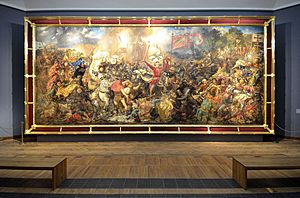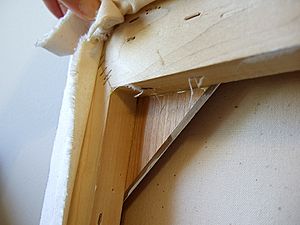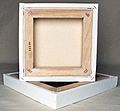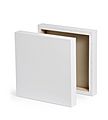Canvas facts for kids
Canvas is a strong, thick material usually made from woven cotton. It is very durable, meaning it lasts a long time. People use canvas for many things, like tents, sails on boats, and even shoes. It's also a popular surface for painting. Canvas often comes in white or a light tan color.
Contents
What is Canvas Made Of?
Today, most canvas is made from cotton or linen. Long ago, it was made from hemp. Canvas is different from other strong cotton fabrics, like denim. Canvas uses a 'plain weave' pattern. Denim uses a 'twill weave' pattern. This means the threads are woven differently.
There are two main types of canvas: plain canvas and 'duck' canvas. The threads in duck canvas are woven very tightly together. The word 'duck' comes from the Dutch word doek, which means 'cloth'.
In the United States, canvas is sorted in two ways. One way is by its weight, measured in ounces per square yard. The other way is by a special number system. The numbers go in reverse of the weight. For example, a number 10 canvas is lighter than a number 4 canvas.

Canvas for Painting
Canvas has become the most common surface for oil painting. Before canvas, artists often painted on wooden panels. Canvas started being used in Italy in the 1300s, but it was rare at first.
One of the oldest oil paintings on canvas is a French artwork from around 1410. It is called Madonna with angels. Famous artists like Paolo Uccello and Sandro Botticelli also used canvas in the 1400s. However, it was still not very common then. Canvas was much cheaper than wooden panels. This sometimes meant a painting on canvas was seen as less important.
Different Types of Canvas
There are many kinds of canvas, each with special features:
- Dyed canvas (has color added)
- Fire-proof canvas (resists fire)
- Printed canvas (has designs or pictures on it)
- Stripe canvas (has stripes)
- Water-resistant canvas (can handle some water)
- Waterproof canvas (does not let water through)
- Waxed canvas (has a wax coating for protection)
Things Made from Canvas
Canvas is used to make many useful products:
- Wood-and-canvas canoes
- Bags, including special coated canvas bags
- Covers and tarpaulins (large protective sheets)
- Shoes, like those from Converse, Vans, and Keds
- Tents
- Uniforms for martial arts (like Judogi)
Images for kids
-
One of Poland's biggest canvas paintings, the Battle of Grunwald, painted in 1878 by Jan Matejko. It is displayed in the National Museum in Warsaw.
-
Bleaching-fields in the 1670s, where new textiles like canvas were laid out to be bleached by the sun.










